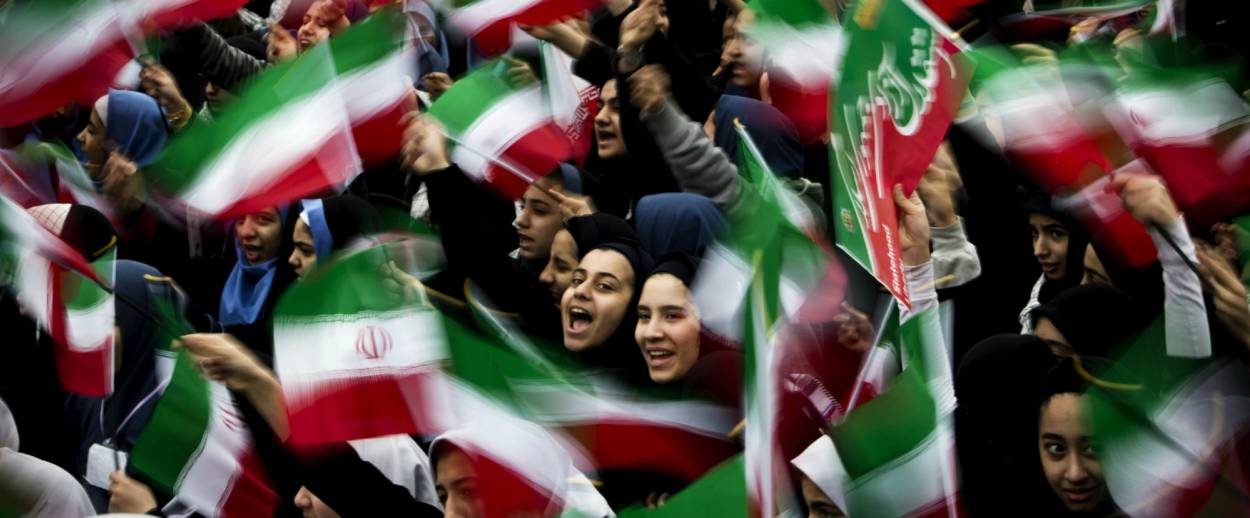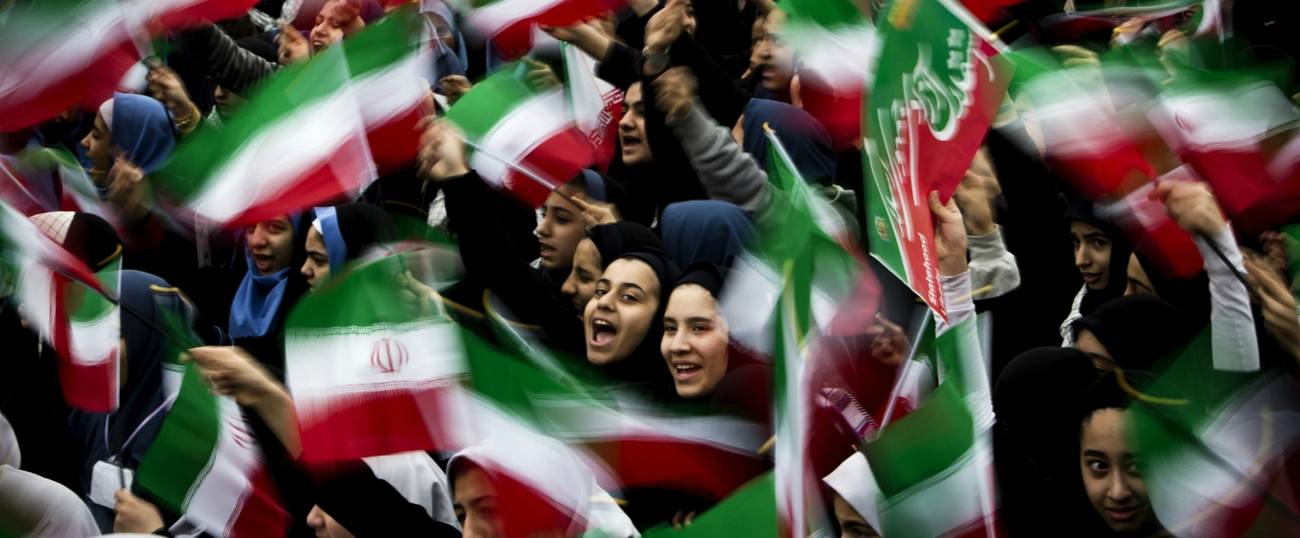Covering Iran
A report from the first journalist from a pro-Israel, Jewish-American newspaper to be granted a visa into the Islamic Republic, is a whitewash that includes the myth of a ‘moderate’ Rouhani




After two years of trying to get a journalist’s visa to visit Iran, Larry Cohler-Esses, Assistant Managing Editor of The Forward, an influential Jewish newspaper in the United States, was finally granted one. On Wednesday, The New York Times ran an article on the first of Cohler-Esses’ two part series, by Rick Gladstone.
While Cohler-Esses’s article is flawed, the Times story, starting with its title “Reporting From Iran, Jewish Paper Sees No Plot to Destroy Israel” can only be described as journalistic malfeasance. In it, Gladstone cherry-picks what interviewees said to Cohler-Esses, distorts his observations, or leaves them out altogether. When you read both articles, one can see that Cohler-Esses’s article is complex, while Gladstone’s version appears to want to assuage the fears of American Jews, Israel’s supporters, and members of Congress about Iran’s threat to Israel in order to put them in a frame of mind more favorable to the Iran nuclear agreement. Gladstone writes:
Mr. Cohler-Esses’s reporting, coming as Congress prepares to vote on the nuclear agreement next month, presents a more nuanced view of Iran compared with the dark descriptions advanced by a number of Jewish-American advocacy groups that consider Iran a rogue enemy state.
Gladstone’s article, however, raises many questions. Writing in Commentary about the Times piece, Jonathan Tobin writes:
But while there is much to criticize in the piece, it does not claim to prove that there is “no plot to destroy Israel.” That is entirely the Times’ invention. It demonstrates how the flagship of the mainstream liberal media will seize upon the pretext to back up President Obama’s false characterizations of Iran and its leadership as posing no real threat to Israel.
Even Gladstone wonders why the journalist was granted his visa at this time: “It is unclear whether the government’s decision to grant the visa was related to hopes of positive American portrayals of the nuclear agreement.”
Cohler-Esses also had to agree to use a government fixer and translator. In Iran, that means the person taking you around is more than likely to be part of Iran’s intelligence apparatus. Nevertheless, Cohler-Esses submitted a long list of people he wanted to talk to and says in the article that he was able to gain access to those he wanted to interview and ask his own questions. He was impressed to the degree that Iranians, including some Mullahs, were willing to express their opinions, some contrary to the official government line. Reformist Grand Ayatollah Yousef Saanei told him that the Iran deal does not “relate to human rights,” and that these come before “anything else,” and includes “Freedom of speech and writing. Freedom of thought. Encouraging people to develop their creativity, instead of this huge investment on military and other facilities.”
A butcher named Nader Qaderi told Cohler-Esses that he thinks the nuclear deal will go through, but “there will be no improvement for the Iranian people. Our main concern now is freedom! I think what we need most of all now is political intelligence…This is the real struggle.” Another interviewee, locksmith Hassan Sha’aeri, said that the agreement will not “make any special change in the lives of people. The power holders will not allow it to benefit the people.” Instead of arts and culture that existed before the revolution, he concludes, “now there are many more problems in terms of things like the economy and political prisoners.”
After his seven day visa is up, Cohler-Esses has no way of knowing whether the government took retribution against some of these interviewees who were critical of the regime. And he provides no evidence that these people, in fact, have any means to influence the government even if they privately do not agree with its policies. Indeed, it is clear from the suppression of the Green protests of 2009 that in fact, their private views hold no influence whatsoever.
Many of Cohler-Esses’s inquiries have to do with Iran’s policies towards Israel and Jews. He came to the conclusion that “ordinary Iranians…have no interest at all in attacking Israel.” When writing about Iran’s Jews, he seems to follow in the same rubric of the reports written in 2009 by Roger Cohen in The New York Times, about how free Iran’s Jews are. In a remarkable phrase, Cohler-Esses actually writes that Iran’s Jews are “basically well-protected second-class citizens—a broadly prosperous, largely middle-class community whose members have no hesitation about walking down the streets of Tehran wearing yarmulkes.” And he buys the line that the Mullahs are only anti-Zionist, not anti-Semitic. The government, he writes, “makes a rigid distinction between hostility to ‘the Zionist entity’ and respect for followers of Judaism.”
Indeed, Cohler-Esses uses his article to give readers the views of Mohammad Hassan Asafari, chairman of the Iranian Parliament’s National Security and Foreign Policy Committee, who told him:
“We pay much respect to the Jewish people of the world. We have no problem with Jews. The belief that the Jewish community has is the same as ours: one God. The problem is the occupying Zionist regime, which is dominating and displacing the native people.”
Cohler-Esses comments: “Pretty much the standard line I heard from everyone.” When he asks Asafari whether they want to destroy Israel, he answers that they want “relations with all the countries in the world- except for the Zionist regime.”
In today’s world, of course, anti-Zionism has become the current version of anti-Semitism, and as anyone in Europe knows too well, the huge demonstrations and marches against Zionism are always intermixed with flagrant old-style anti-Semitism.
Cohler-Esses writes: “Far from the stereotype of a fascist Islamic state, I found a dynamic push-and-pull between a theocratic government and its often reluctant and resisting people.” However, he concludes that in Iran, there are “three players: the people, the government and, for lack of a better term, the Deep State, which in the person of the supreme leader claims to act on God’s behalf to ensure that neither of the other two parties strays beyond God’s boundaries as defined by Islam… [the] darkest chapters [in Iran’s past] stemmed from the actions of this Deep State.”
And what is the opinion of the Supreme Leader? It is easy to find out. Ayatollah Khamenei’s new book advocates the destruction of Israel. The Ayatollah writes:
The only accepted treatment for the wound of Palestine is to cut and remove the cancer gland of the Zionist government, and this is possible…. Our position against Israel is, as always: Israel is a malignant cancer gland that needs to be uprooted. In contrast to what shallow people believe, it is not impossible to defeat Israel and the United States.
What is important is that Khamenei bases his belief that Israel must be destroyed on the words of the Prophet. To be a good Muslim in his eyes means that one has to be an opponent of the Jewish state; it is not a matter of policy, but a fundamental, theological belief that defines his entire position. It is the equivalent of Hitler’s views that the goal of the Third Reich was the elimination of the Jews, which took precedence even over military strategy.
Perhaps Cohler-Esses’ article is not as bad as the reporting from Iran in 2009 by Roger Cohen. Yet, I think it comes fairly close to the rosy picture of Iran and its Jewish community that Cohen presented to readers. It is apparent that Cohler-Esses believes some kind of “push-and-pull” exists in Iran between the people, the government and the Mullahs, and that somehow the latter can be influenced. His example is the election of Iranian President Hassan Rouhani, whom he clearly sees as a “moderate” rather than as a leader who, while hoodwinking American leaders, presided over the increasing domestic repression taking place now in Iran. He acknowledges that in 1988 the forces of the “Deep State” murdered 30,000 people, and in 2009 brutally suppressed the emerging forces of young people who made up the Green Revolution. Yet somehow, he hints that he thinks the privately stated views of people he spoke with can or will moderate the regime. Of course, no evidence for this exists at all.
Despite an attempt at nuance, Cohler-Esses’ article does not achieve the impartiality and objectivity that The Forward’s editor Jane Eisner says it does. Nor does it provide material that both sides in the Iran nuclear debate will find things of which they approve. Its total effect is a whitewash of Iran. For example, Cohler-Esses writes that the “Deep State…is not immune to popular pressure.” His proof? Again, he points to the election of Rouhani. Those who look at Iran’s domestic policies know that repression has increased, with more political arrests, regular hanging of gays, and the complete lack of freedom of speech. The West’s view of Rouhani as supposedly a “moderate” is obviously a myth he fully believes.
Iran may not be a “fascist” state, but it is a tightly controlled theocratic regime, run by Islamic fundamentalists whose raison d’etre is the elimination of Israel and a war against the United States, “the great Satan.” Mr. Cohler-Esses’ article shows he does not understand this, and sees the Mullahs who told him what he wanted to hear as what the regime really believes. No wonder The New York Times, whose editors favor the nuclear agreement, has given his story so much space.
Ronald Radosh, an Adjunct Fellow at The Hudson Institute, is a columnist for PJ Media.